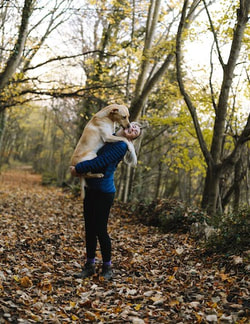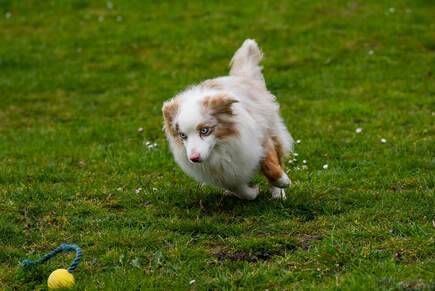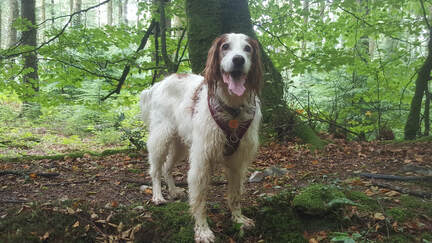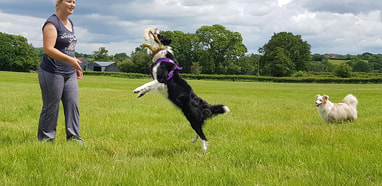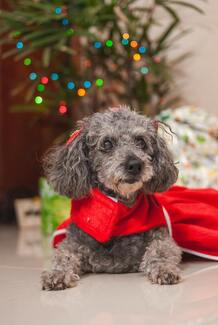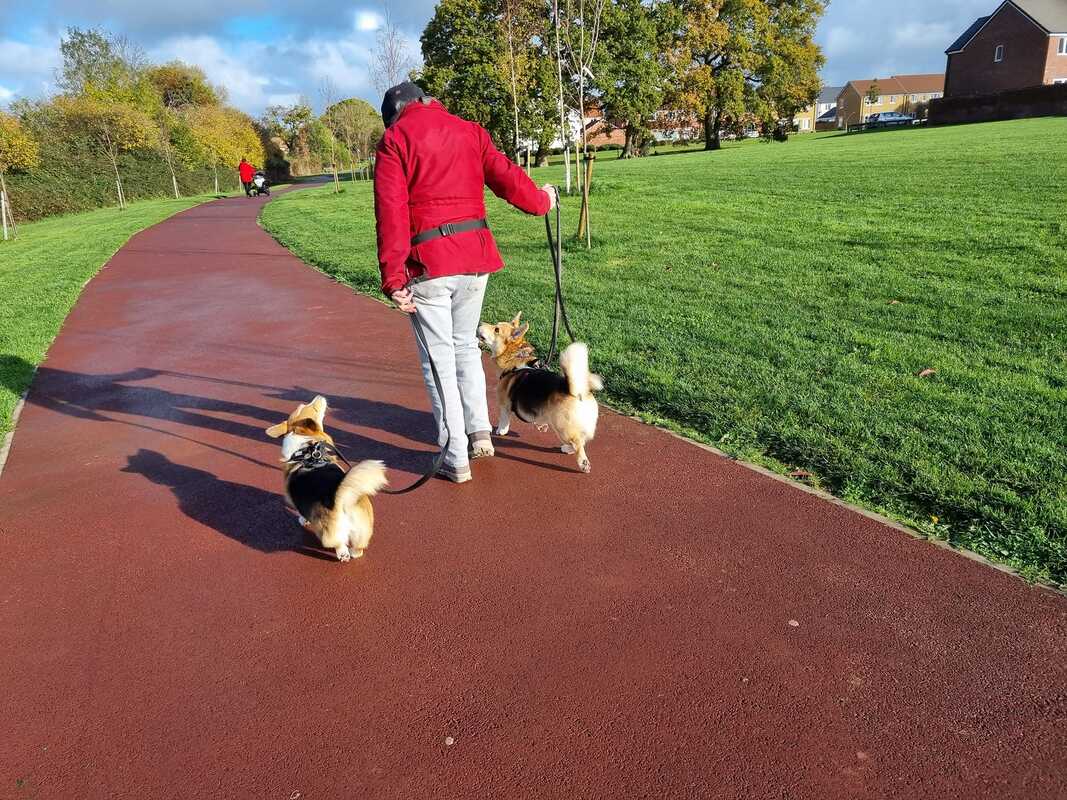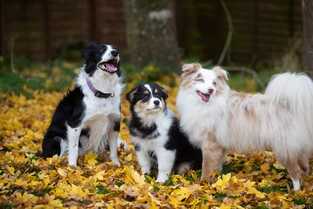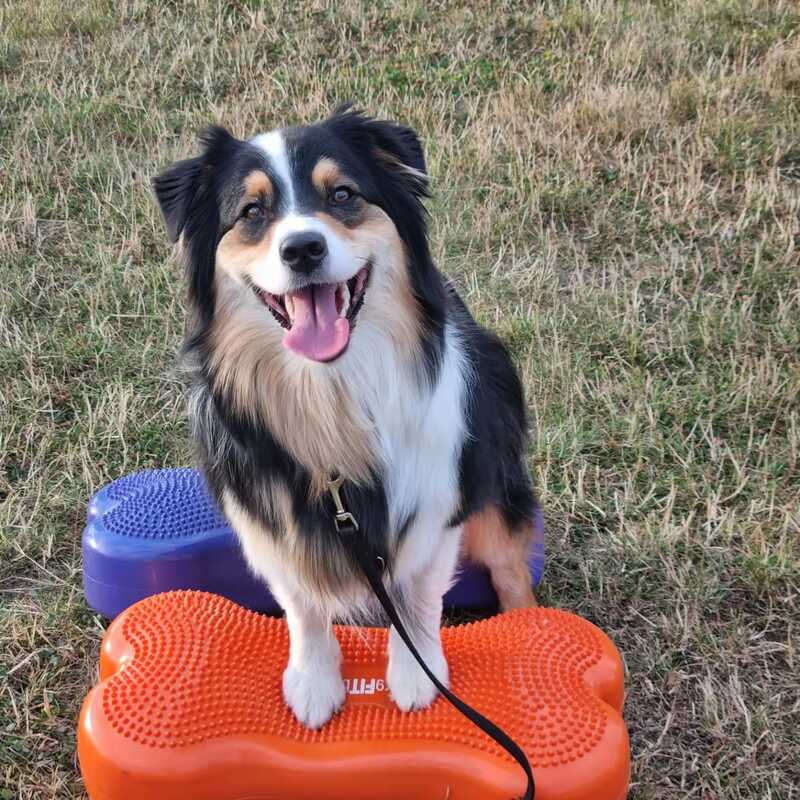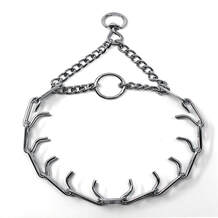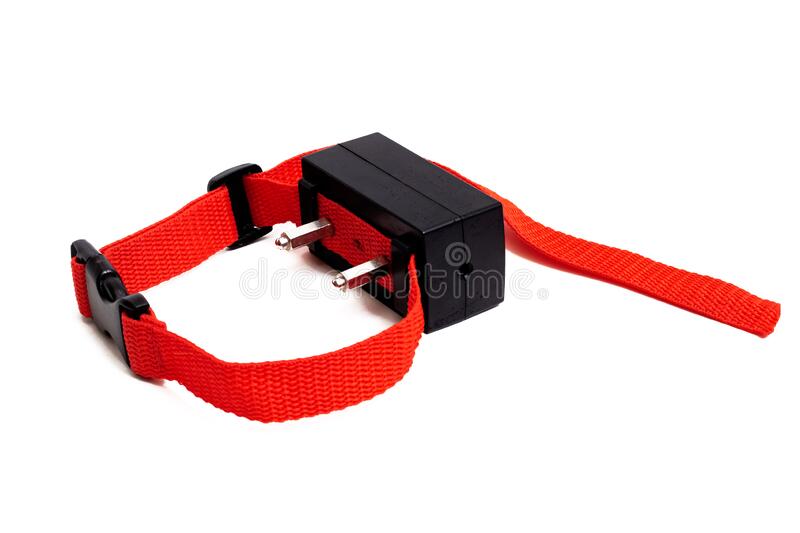|
I have just read a recent website article titled “How to Dominate a Dog and become the Alpha Leader”. This was written this year and the ‘expert’ writing it gives advice about how to makes sure your dog knows you are Alpha. Some of the suggestions were:
Make eye contact – stare at your dog when are they acting out of line. Don’t let your dog walk in front of you because only the Alpha leads the pack. Control all the resources – don’t let your dog have any food or toys without you giving it to them. Don’t allow them on the bed or sofa. Misbehaving is your dog trying to test the boundaries and needs to be corrected. Get your dog to earn everything – nothing is for free. All these things make you a strong leader and is you asserting your dominance so your dog will learn to be a well-behaved canine. I honestly cannot believe this sort of article is still being written and still allowing people to be misinformed about how to train and live with dogs. This information is so outdated. It has now been disproved by scientists; however, these sorts of myths just won’t go away. I feel so sad for dog owners who are trying their best to raise their dog to be a wonderful family member when these sorts of articles are still being spouted by so called experts! Why do we seem to cling onto outdated, factually incorrect information? Is it deeper than this? Is it that sometimes we feel out of control with our dogs and that being told to ‘be more Alpha’ connects with something more basic that makes sense to us? If we fear something or don’t understand it, then control must be the only option? Discipline is needed. Right and wrong – a moral judgment is required. Dogs are not moral. They have no concept of right and wrong. They see the world as what’s successful/safe versus unsuccessful/unsafe. So, when we say things like “they knew they shouldn’t be doing that” it’s not correct. Yes, they give a brilliant ‘guilty’ face, which we take as them ‘knowing’ they did wrong. The appeasement body language they are displaying is in response to your emotional state or past memories of what happens in these situations. For example: your dog chews the sofa when you are out of the house. You come home, you are angry and shout at the dog. Dog learns, when you come home you are sometimes angry and upset, so they learn to show appeasement when you return home. The sofa chewing isn’t in their radar of why you are reacting like that. You need to look at why the dog was chewing the sofa: boredom, stress, anxiety, teething etc. The underlying reason of ‘why’ needs to be addressed, not punish them for doing it. I honestly understand that sometimes our dogs can cause us stress, worry and anxiety. Some behaviour problems can impact every aspect of our lives. Not being able to walk on the beach in case you see another dog, not having visitors in your home for fear of them showing aggression, not being able to go out to social events because your dog cannot be left alone. There are lots of behaviours that our dogs need our support to help them with, to live in our human world. They don’t need us to dominate them, to be more Alpha, to stop any freedom of choice or prevent them from having a trusting relationship with us. If you get a dog to dominate and rule like an Alpha, then can I please suggest you don’t get one. Jo x
1 Comment
Do you know the difference between a reward and a reinforcer? We use the term reward-based training often, but if you only reward the behaviour and your dog isn’t actually getting reinforced then the training outcome you are working towards is unlikely to be achieved.
The quick way to know if the reward is actually reinforcing the behaviour is to see if your dog is willing to repeat the behaviour. If they don’t want to repeat it – it wasn’t reinforcing! This is when we start to say that our dogs are dumb or stubborn. This isn’t correct or helpful for us to think like this. Our dogs are very intelligent but also honest. They will repeat a behaviour that is worth doing again. They are looking for rewards and reinforces in their daily life (just like us!) so why would they do something that doesn’t have any fun outcomes? How much would I have to pay you to do a job you didn’t want to? A job I hate to do is cleaning the windows of my house. So if I did it and only got a ‘thank you’ from my husband, I am less likely to want to do it again. However, if after I finished all my friends turned up and had a party, then you know what, I might be more likely to happily clean my windows more often! So in this situation, in the first instead I did get rewarded by verbal praise. However, this reward didn’t increase my desire to repeat the behaviour of cleaning my windows. In the second example, I got a wonderful evening with friends, that reward reinforced my behaviour so I am now more likely to do it again. By the way, I now pay a window cleaner as really don’t like that job and my friends don’t turn up to party after I do it 😊 Top tips to help with your training: 1 – Play more! Find out what games your dog likes. Is it tug, chase, bounce? You can build an amazing relationship with your dog once you understand their play style. Also take your games on your walks. Most of us only use games at home with our dogs and don’t think about taking this fun interaction outside. 2 – Tone of voice – be aware how you speak to your dog has an impact. If you are stern in your tone, then that ‘control’ you think you have will only last to a certain point. Who wants to do things because they are worried about the outcome if they don’t do it? At some point, the dog will choose the other more fun option such as chasing the squirrel or running with another dog. Keep it happy and light. 3 – Words – do you ‘nag’ at your dog? Keep repeating the same cue and expecting them to respond? Do you constantly ‘chat’ at your dog and just expect them to know what is chat and what words they should respond to? Make sure you are clear with what verbal cues you expect your dog to understand and respond to. 4 – Management – the old classic of using management so that you dog gets it right. Don’t set your dog up to fail – I say this a lot. If you know in certain situations your dog is likely to do the unwanted behaviour, then it’s your job to put in the management required to keep them safe and not allow them to rehearse the behaviour you don’t want them to do. Using a long line, or using a stairgate at home, these aren’t failing, these are management steps. 5 – Celebrate small wins – it’s so important in anything you are training your dog to do, to celebrate each small progression step they make. Slow and steady is the best way for your dog to learn a new skill, so make sure each step is rewarded. 6 – Natural outlets – is your dog allowed to be a dog? Do you give them appropriate outlets where possible? If you have a dog that loves to dig – have you got an area in your garden where they can dig or a sandpit filled with sand and toys to find? Do you sometimes hire a dog field and let them freely run around without worry of what you might come across? Especially useful if you have a dog that struggles around other dogs and people or a young dog that doesn’t have a reliable recall yet. Do you allow your dog to choose the pace of your walk? To allow them to stop and sniff as much as they want or even choose the direction they go? My challenge to you is to really start thinking about what your dog finds reinforcing as this really will help you with your training goals. Jo x I went to Crufts for 2 days this year. I have been going for many years and decided 1 day just wasn’t enough so the last few years I have gone for 2 days and stayed overnight. Mum and I go and have an amazing time cheering on people we know in various dog sports and showing. Showing I have to say isn’t really ‘my thing’ so spend most of our time in the big arena watching agility, flyball, obedience, heelwork to music and all the other brilliant displays. I love understanding how much work and time and sometimes tears has been put in to achieve the level of skill that each dog and handler are displaying and to be able to do it whilst being watched by thousands is amazing. The relationships are wonderful to watch no matter what age.
Another reason I go is to shop! I like to speak to various stands to learn about new products, diets, treatments and to meet up with people from my membership organisations of APDT & PACT. We always go round Discover Dogs and find out information about breeds I don’t know much about. Speaking to people that own these dogs is the best way to learn the truth about them and know if they would be suitable. We also pick a breed that we would have – cannot be one you’ve had before – a fun game 😊 However, I am always torn as to whether I should support everything that this show stands for. I really struggle to see certain breeds of dogs that clearly struggle to function as a normal dog. Brachycephalic (short nosed dogs) that cannot breathe, German Shepherds which have such bad slopping backs that it impedes their movement, Labradors that are clearly overweight – this list goes on. All these dogs are in the show ring and therefore are a good ‘breed standard’. I see dogs that are showing lots of stress signals simply being in that environment. I also witness some horrible handling of the dogs. The worse was on Gundog day; 2 children, under school age, were pulling their Labrador around, on a slip lead, whilst the parents just stood and chatted to other competitors. When the girls screamed, it was only because the other child wanted their turn to hold the lead, the parent gave the second child the dog lead and she then proceeded to drag the dog around and around in circles. The dog had a tucked tail, was licking his lips, licked their faces and was showing every appeasing signal possible, and no one was listening or responding to him. It was so desperately sad to watch and know that this dog was such a lovely dog to tolerate this. As a country of dog lovers, it makes me so upset that we don’t learn to read and understand our dogs. It should be our responsibility to learn how dogs communicate and to listen and respond when they do talk to us. After saying all that, I know I will more than likely attend next year. It’s a very tiring day as you walk miles around all the halls, but I do love it. I think you have more chance of making changes from the inside rather than just not engaging. Most of the organisations are wanting the best for the dogs and are working towards improving their breeds and focusing on welfare overall. So that I want to support. So, what are your thoughts? Are you a yes or no to Crufts? Jo x Was it a certain breed you always wanted? You grew up with a similar dog? Did you see them on a rescue page and fell in love? Did you meet one in the park, and you knew that was the right dog for you? There are so many reasons why people pick a certain breed or type of dog.
When I was 12 years old I met an Irish Red & White Setter when I went to dog training classes with my parents when they were raising their Border Collie Mac. I knew from that day, one day I would get a Red & White Setter. I thought what a beautiful dog, gracefully yet silly, intelligent and loved to work. When I was 30 I knew I was able to consider getting a puppy. I had enough time, money and knowledge to devote to raising a pup. Most people don’t even know what a Irish Red & White Setter is; I used to get asked if he was a big spaniel or some sort of cross. They are not a common breed, so I had to wait for the right breeder with a suitable pup for us. We welcomed Morgan into our family and he was just as I hoped. The long legged, handsome, regal I always used to think, silly puppy. At 8 months of age, I still remember this so clearly, we were on a walk, and he did his first ‘set’. He froze, stalked and then flushed a pheasant out from the grass. I didn’t see the bird and up to that point he hadn’t shown any of these behaviours before. His recall was great; however now everything has changed. His natural genetics had kicked in and his desire to flush birds was now the most important thing in his world. The fact as an adolescent he discovered his natural breed traits shouldn’t have been a surprise. This is the age where your dogs will be developing and learning, and this time is when your relationship can be tested as the pup you were raising has now changed. This is why you need to know what your dog was originally bred to do. That way you can focus your training on what is likely to show up. Are they more likely to bark? chase? hunt? destroy? bite? Anyway, back to Morgan. We spent the next year with him on a long line (we hadn’t needed to use one up till then) and spent lots and lots of time working on his engagement with us and not allowing him to freely chase birds. The internal rewards he would have felt when he flushed that bird; there is no food or toy reward I could use to show him staying with me was better! So management is required. Don’t let your dog rehearse a behaviour that you don’t want them to repeat. We spent lots of time working on focus and engagement type games, building our relationship and yes we did also allow him to flush birds sometimes – but only when he was given a cue to do so. I love giving dogs access to their natural outlets, but there needs to be boundaries to keep everyone safe. There are some behaviours that you can give an alternative outlet rather than access to the thing they actually want. During these challenging training times, this is when having dog can make people turn towards punishment-based training methods. I know lots of people that have come to me, that have been told by others that their chasing dog needs to have an e-collar on to teach them not to chase. These e-collars give an electric shock to your dogs neck when they do the ‘wrong’ behaviour. Please Please Please never feel like you need to use any training that causes pain, fear or intimidation. As the more intelligent species, we have so many more options as to how you can train your dog to listen and respond to you. I feel so sad when I hear people have used these types of equipment because they felt they shouldn’t be using them, but a trainer told them to, so surely it must be ok? NO! Dog training and behaviour is an unregulated industry. Anyone can set up a business and call themselves a Behaviourist or Trainer. Please check the people that you use are accredited with a membership organisation that actually ensures they are using only up to date, science based, rewarding methods. Anyway, back to Morgan and his pheasant chasing. Yes it took time, and yes we made some mistakes along the way (he got some free chasing that wasn’t planned) but yes we did get to have him off lead in all locations with a great recall around birds. If you have a working breed, you must expect that some of their natural behaviours will show up. Are you aware what your breed or crossbreed were originally bred to do? If you are considering getting a dog, can I please encourage you to research the breed. Don’t be tempted on looks alone. Another trainer described a working line dog as the Ferrari of the dog world. I love cars even though I drive a van! I would love a really fast sports car, but I certainly wouldn’t want that to learn to drive in one. Actually, if I just want to pop to the shops with kids in the car, that wouldn’t be suitable either. Maybe a Ford Focus would be must more suitable as the all-round car? I love this analogy of dog breeds. What do you want from a dog? Is it an all-round family pet? Or is it a high drive sporting breed? Do you just want to enjoy walks on the beach, or need to take it competing and giving it a special lifestyle? If you get a dog from working line parents – what do you think you are going to get? Something to consider when researching your next dog or perhaps looking at the dog you have now. If you are struggling with your training, have you consider breed type? Genetics? Can you give them more appropriate outlets? As always, if you want to have a chat about your dog, don’t hesitate to give me a call. Jo x This is the usual request I have when people contact me for help with their dog. Their focus is on stopping the dog doing a behaviour that they deem wrong. There is always an urgency to get the problem fixed as soon as possible and a hopeful desire that it won’t take too much effort.
If we are honest, we are all the same. We want to solve any problem with as little effort as possible, and preferably achieve the result by tomorrow, well actually yesterday would be better! Who wouldn’t want to lose 2 stone overnight without any effort or be able to run a marathon without any training, or learn everything you needed to pass your maths A level in just one lesson. I get it; however, this mindset doesn’t help when working with your dog. Some issues are going to take time and patience to achieve the goal. There has been a rise in social media videos showing all these ‘quick fixes’; how if you only buy this piece of equipment or use this easy method, all your problems will be solved overnight. I have previously written about ‘balanced trainers’ and those that think it’s ok to use punishment in training, so I am not going to focus on that today. What I want to talk about is the human end of the lead. I understand that having a dog can sometimes be really hard work, but I think we sometimes miss all the fun you can have too, especially when working through any behaviour or training challenges you have. I have lots of puppy owners on my Pawsome Puppy Programme, that reach out and ask for help with toileting training or biting issues; I of course help with advise, but I also tell them to remember to enjoy having their pup as the time goes so quickly, you must remember to enjoy this stage. If you have a ‘teenager’ and every day seems to produce a new unwanted behaviour, such as chewing or ignoring their recall, then understand that some behaviours are age related and it is part of their journey into adulthood and therefore management might be the only thing you can do for now. If you have a reactive dog that struggles on their walks, then why don’t you hire a rented dog field and just go and have some fun together or don’t walk them and engage with some fun games at home instead. It’s ok to give yourself and break and stop focusing on everything on your ‘to-do’ list. Sometimes I think we need to ‘be more dog’ and treat each day with the outlook of ‘what is the most fun thing I can do right now?’ I love that attitude and wish I had it more often. Building your relationship of trust and understanding with your dog will actually be the best way to spend your time together. Yes, you need to spend time showing them and helping them to be a good ‘canine citizen’ as they do need to live in our human world, but today I want you to remember: Sometimes you just need to go with it and play with your dog! Jo x It's time to start thinking about Christmas! Now I don't mean what presents you need to buy; I mean thinking about how your dog is going to cope.
Think about all the changes that will go on over the festive period: Trees and decorations go up, extra ‘nice’ food is brought, family members come to stay and maybe a totally different routine if you are having some time off work, kids home from school and maybe you’ll be going on different, longer, busier walks. It is hopefully a lovely time to look forward to, but I want you to consider your dog during this period. If you have a puppy or younger dog, then you will definitely have to manage your house. You shouldn’t leave your pup alone when the Christmas tree that has just gone up! If you have a real tree, I really do think our dogs must think we have gone a little mad that the rules for this tree is different to the ones outside!! Definitely no weeing up this one 😊 Chocolate is toxic and if you usually hang up chocolate treats, then please don’t – it’s just not worth the risk. The box of Celebrations or Quality Street must not be left in the lounge unattended, so make sure the children (or adults!) don’t leave the lid off. The most common Christmas food that are toxic to our dogs are: Chocolate, onions & garlic, macadamia nuts, corn on the cob, avocado, artificial sweeteners (xylitol), alcohol, cooked bones, grapes & raisins. I love giving my dogs their own Christmas dinner, but please be careful with what is included. Another risk are flowers or plants. Mistletoe is a common plant during this season, but this is toxic to our dogs. Please be aware if you are using this in your home. There are lots of other flowers and plants that you need to be careful of. See this list by The Blue Cross https://www.bluecross.org.uk/advice/dog/plants-poisonous-to-dogs I want you to give your dog a quiet space. They need to have a safe space that when they want to relax, they know where to go. Now is the time to start using this. This could be a crate, or pen or their own bedroom – whatever works in your house. Show them that this place is wonderful and they get lovely chews toys, or their dinner now is fed there. Make it a positive spot, not somewhere they get put to get them out the way. Some dogs won’t be able to make the decision that they need some quiet time, so you may have to regulate them more than you usually do. Guests in the house or you going to somewhere new will all disturb your dog’s usual routine. This doesn’t mean that it’s bad, but you need to be aware that if your dog isn’t getting enough rest and sleep then you are likely to see some behavioural fallout. If you have a pup, then biting will almost certainly increase. Toilet training may go wrong as you aren’t watching pup as you are busy doing other things. Stealing opportunities have increased whether it’s new toys the kids have got or all the extra food – please manage your house so that your dog doesn’t make any mistakes. Have a supply of chew toys, activity feeders or cardboard boxes that if your dog does need some time away from all the busyness, then you have something ready to entertain them. The Boxing day walk was always a nightmare for me when I had a ‘reactive’ dog. I used to dread these bank holidays when everyone was out at the wrong times and messing up all my quiet walks that I usually use. If you know your dog will struggle with the extra stimulation of these busy walks, then please remember you don’t have to walk your dog!!! It’s still such a stigma that you are a bad pet parent if you don’t walk them every day. Well, I’m here to give you full permission to not walk your dog. There are so many ways you can give your dog lots of enrichment at home and don’t need to increase their stress levels. I am hoping to just get you thinking about the approaching festive period and think about what your dog might need to make sure you all have a very happy time together. If you have any questions about how to make sure your dog is supported, then please don’t hesitate to get in touch. Jo x I love having multiple dogs – the most I’ve had is 3 at once but my parent’s dogs are also a regular part of family so that gets us up to 5 in lots of situations. I love the different dynamics, the different personalities and the different ages and all that brings. However, adding a new member to your family should be considered carefully and I wanted to share my thoughts about doing this.
Firstly, have you considered if your existing dog would actually like to have another dog? For example, if they are older and you are wanting a pup – this is fair? Pup won’t have any manners and will just want to play and rough and tumble all day, and your older dog really might not find that fun. What happens if they don’t get along? Have you thought through the fact you might need to have a divided house? Could you cope with this? When people ask for my opinion on whether a second (or third, fourth) is the right choice then my first response is you only get another dog if you personally want one. You don’t get one just as a play mate for your existing dog. It doesn’t make life easier!!! Adding another dog means twice the work, twice the time, twice the money. Whatever time you spent raising and training your first dog, your second dog also needs this same amount of 1 on 1 time plus your existing dog shouldn’t miss out so want time with you too. Food, insurance and vet bills will double. If you get a pup then they need to be walked separately, socialised and trained separately (so they don’t become too dependent on your older dog) and then your older dog still needs their longer walks and training/play time. Yes, after some time you can do walks together (when pup is able to do longer walks) but it’s really important to still have 1 on 1 time throughout their whole lives. I recommend a minimum of a 2 year ago gap if you are getting a youngster so that they have time to mature and time to learn their own training skills. If you rehome a dog, then you need to spend time doing gradual introductions and make sure both dogs are comfortable with each other. Comfortable to share you, space, food, toys etc. This process can take some time. Training them both to walk nicely on lead when in the company of a second dog, especially if one doesn’t have any learning yet, will be a challenge. Can you hold 2 dogs if they both pull perhaps if they see something exciting like a squirrel? I always like to try to make sure existing dog takes priority – their life shouldn’t be negatively impacted if I want to add another dog to my household. However, the new one usually needs the most amount of your time initially, so be prepared to allow the time and space to give both dogs what they need. We had a foster dog recently that didn’t get on with Cuba (my male dog) so we had to separate the house (closed doors) to keep everyone happy and safe. We did this for 9 weeks and honestly, I found this really stressful; I was worried about a mistake being made with an open door and the dogs having a fight. I felt guilty not giving all the dogs as much time as I would have liked. I know lots of people that do live with a spilt house, but it’s not something I would like to have long term. Thankfully he has now found a new home and is now very happy with his new family. This isn’t a ‘please don’t do this’ type of blog. Social learning, so your older dog showing the younger one the ropes, is definitely a thing. It can make some things easier as you don’t have to show your new dog all the ‘house rules’. However, I do find the new dog usually just learns all the things that from your other dog that you wish they didn’t!!! I love sharing my life with dogs and feel very blessed to work with all your dogs too and knowing that each and everyone is so unique and really can give us such joy and pleasure. Jo x PS The photo is of Pauline who recently added a second Corgi to her household, and this is one of her first walks where she is confident walking both dogs together 😊 I love supporting people to achieve their goals of a happy relationship with their dog – no matter how many they have. Hallie has been with us for 2 years now. We got her during ‘lockdown’, and I thought it might be useful for me to reflect back on our last 2 years and share our journey.
Whoever said getting a puppy is easy has either been really lucky with their puppy or have totally forgotten how hard it is! Having a puppy is a shock to the system. Your life has to adjust to this new furry family member whether that’s coping with existing pets, or work patterns or simply just puppy proofing your house. For some the lack of sleep as you have to get up during the night for toileting is enough to make them question their decision, not to mention the ‘land shark’ that now inhabits their house and wants to rip all their clothes and chew on their fingers. Hallie is my third pup and sixth dog (not including dogs I grew up with) so surely I knew what to expect? Yes I did, but didn’t stop it being hard work! Hallie was a very bitey pup! Jon and I had to get changed into old clothes when we were interacting with her to save some of our trousers. A true herding dog! She didn’t want to stop, and therefore finding the balance of activity and downtime was hard to discover. Toilet training took several months to be 100%. Night times she slept in our room for the first month and then she easily moved to her downstairs area once she was confident to be alone. Bria loved her from day one. I was worried about this as Bria had back issues we had to manage, but this pup seemed to win her over. Cuba was interested but definitely gave me the look of ‘what have you done?’ on many occasions! However, the dogs did settle well together quite quickly. I do my best to make sure existing dogs don’t miss out too much and still get their own special time. Adding another dog to your household requires lots of extra time; it doesn’t make it easier. As the country was in and out of lockdown during her first year, I knew I had to make sure I focused on getting her confident, as she will hopefully be able to help me with clients in the future. The only thing we couldn’t practise during lockdown were visitors in the house, but everything else was available to us, it just took some planning. I know I have written about this before, but there is a big misconception that raising a confident puppy involves loads of off lead romping with lots of dogs and people. It doesn’t! It involves gradually exposure to the world in the whole; noises, places, yes dogs and people, but that’s only one part. Puppy classes weren’t running, so we made sure a few times a week we drove to new areas and saw different locations as our rural village would not have given her the right level of exposure to the human world. She was a confident pup so took most things in her stride. Her breeder did an excellent job during those first 8 weeks to start her journey right. Adolescence is a hard time for most pet parents. This is when your pup is pushing boundaries, having an increased desire to explore, less likely to listen, prey drive starts to develop (e.g. bird/rabbit chasing) and their desire to be social increases yet at the same time they have fear periods which need to be managed. I actually enjoy this time in a dog’s life. I love getting to know who they are as their personalities are showing through. Yes it can be hard, but I really want to encourage you to enjoy it! They grow up so quickly. One of Hallie’s big challenges is that she loves to jump, straight up in the air, at any passing person 😊 So we had to a manage her on walks so she didn’t get to rehearse this very Aussie trait. Her guarding behaviour also increased which was timed with her first season. We had to manage the house with regards to the other dogs as she directed her guarding behaviour mostly towards them. My constant aim is to ‘set my dog up for success’. Management is required for all dogs in some areas whilst they are learning. If your dog is doing something you don’t like/want, then you need to think how you can change something so they cannot practise it. That might mean using a long line on walks or keeping kitchen counters clear or using stairs gates etc. With Hallie she is loves to work, so training any skill she was brilliant, but Aussie’s are sensitive souls, so I always have to be careful with our plans. Fast forward 2 years of fun, play, mistakes (we all make them!), learning and building trust, she is now a wonderful girl. Is she perfect – definitely not!! Do we still have things to work through? Yes absolutely! Learning is happening 24/7 throughout their lives so the opportunities to improve are always there. To those that have a youngster, I want to say well done with where you have got to. Keep going. Keep focusing on the small goals and keep moving forward. You will get there. Plus, I want to say enjoy the ride. Our dogs aren’t around long enough so even if you feel like progress isn’t happening, if you focus on building a brilliant relationship of fun and trust with your dog, then you are going in the right direction. Jo x I am definitely a country girl. I feel safe and comfortable with fewer people and more animals and fields. I would be happier to walk alone in a wood than walk down a busy high street. I know this and am very grateful that I live in a quiet village surrounded by countryside.
This fact was really brought to my attention when my husband and I went to Wembley. We have been a few times before, but Jon wanted to be in the crowds on the pitch area – so no seats. I agreed knowing that this wouldn’t be my choice and that I may not be able to cope being surrounded by so many people, but I was willing to try. So, we got the train into London, my stress levels are already slightly higher, checking the map to see what underground to use, what time and which platform – I am out of my comfort zone. I have been to London often, and I do love it, but it causes me stress as it’s not my normal. I have to concentrate more, and I worry about things I don’t usually. So I am in a heightened state, but this doesn’t mean I’m not excited as well, but my adrenalin is definitely pumping. A few train changes and we then walk into Wembley. We work our way to nearish the front (well Jon would have been closer I’m sure) and I was doing ok. There was some space around us, and we started to enjoy the warmup acts. Over the next 2 hours more and more people were arriving and our space that we thought we have ‘claimed’ was shrinking. Then Coldplay come onto the stage, the crowd erupts and the dancing starts. I love dancing and was initially doing ok. Yes, I kept being bumped into by the surrounding crowd, but I was telling myself to keep calm! I was enjoying myself, but just really wanted a bit more space. My back started to complain that I had been stood up for many hours. All this started to ruin my enjoyment of the show and after about an hour, I told Jon I needed space. We managed to squeeze through the crowd and get to the edge. Fresh air!!! Wow I hadn’t realised how tense I had actually got, and the relief felt amazing. I was able to stretch my back, to have no one in my personal space and was actually able to see the stage clearer, so was able to finish to show feeling so much better. However, my anxiety hadn’t finished yet. Because as the concert started to come to an end I was thinking about the underground. Most of these thousands of people will be leaving at the same time and all heading towards the station. The walk towards the station was a real challenge to me. Thousand of people all working their way around stairs, barriers, security staff and then a train platform and the train itself. Sardines came to mind. Jon was of course doing his best to help me, to sometimes create a barrier between other people. A few stations along, the train gained space and I was able to sit and travel back to the hotel. So why did I put myself through this? Simple; I choose to. I knew that it would find parts of it challenging but the overall outcome would be enjoyment. Yes, being on the pitch area wasn’t for me, and yes if it was possible, I would choose not to do big crowds, but I really enjoy live music and I really wanted to see Coldplay. So why I am telling you all this? Well, it got me thinking about dogs that need space. We usually call these ‘reactive’ dogs. You’ve probably seen them or might have one yourself. These dogs when too close to a ‘trigger’ such as other dogs or people, will bark, lunge and react in a way that we would choose they did. Well. I felt like a ‘space’ dog during my trip, but the difference is that I choose to do it. I made the decision, I knew what was going to happen, I was able to plan ahead, I was also able to change my mind and move away when I needed to. I didn’t need to ‘bark’ to get space, I simply moved away or was able to talk to myself and keep calm and work through a situation, knowing there was an end coming. What if I wasn’t given choice? What if I didn’t know what was happening? What if I couldn’t just move away and to make myself feel better? What if I was attached to another species that didn’t understand my communication? Now can you see why I am comparing my experience with that of a ‘reactive’ dog? A dog that struggles in certain situations. Dogs that aren’t given the choice. That aren’t understood and are just seen as disobedient? Some dogs would prefer to be a county dog. Some dogs love the busyness of town life. Some dogs are social butterflies, some prefer their own space. I believe we can help either version of dog to adapt to living in any environment, to have skills to be around their ‘triggers’, but it may take time and understanding on how to help them cope if this isn’t easy for them. We also need to understand that they all have their own personality, and we should be their advocate, so they don’t have to experience daily stress. Will I go to Wembley again? Yes! Will I still probably struggle with the crowds? Yes! Will I choose seats next time? Yes! (sorry Jon). However, I gain confidence in that I have choice and know I will be with people that can help me if I need it. Your dog might need some help and support too, so watch, listen, are they doing ok with what you want from them? Do they need something more from you to reduce their stress? If you would like any support, then don’t hesitate to get in touch. Jo x I have been wanting to write this for a while but due to me not wanting to risk the criticism I have stopped myself. There are very strong opinions on this subject.
I have previously written about making sure people do their research before working with a trainer or behaviourist to make sure they are accredited and use force free methods, but I have always made my posts quite ‘polite’. However, I keep seeing so many balanced trainers posting videos on Facebook or Instagram that I have to speak up. I want to make sure as many people as possible know that there are other options when training dogs (or any animal) that don’t cause fear or pain. So let’s clarify what a balanced trainer is. They will usually say they are based in science as they use all the quadrants of learning. That means they will use reinforcements and rewards as well as punishment and fear equally, hence the ‘balanced’ term. Their argument is that science shows that an animal can learn by using these methods and therefore get the wanted results so why would they not use them. However, when I read these arguments about the best methods to use to train a dog, the subject that is missing from balanced trainers is ethics and welfare of the animal. Does punishment work – in short – yes! If you threaten me with violence or a knife, I will most likely comply, and I’ll do what you want me to do. However, do I trust you now? Do I want to be near you? No! Am I doing the behaviour due to fear – yes. The prediction of pain – the sound of the buss from an electric shock collar, or metal jangle of the prong collar – I would do my best to avoid the pain. So over time can you see that although the behaviour might be learnt (why risk causing pain) I would live in a world of fear and intimidation. I would shut down and wouldn’t feel that I had choices and therefore just wouldn’t engage. The risk of making a mistake would be too great, so I would simply stop. This might look like a very well-trained dog – to me all I see is a broken spirit; the light has gone from their eyes. Or the other possibility is that I would learn to fight back. To not accept that I had to comply and would react, show aggression by growling or biting. That would most likely result in that person having to use more intensive punishment to get the same result. I would be branded as stubborn, or wilful, or not knowing my place in the pack. Perhaps I am a certain breed, and I need a firmer hand (this isn’t true by the way). The ‘explosion’ of a dog that has just had enough, and the bite that comes out of nowhere. The behaviour is suppressed, not resolved, and it’s likely to rear its head at some point. Dogs are sentient beings which means they have emotions. They can experience stress, anxiety and fear. This can impact their physical and mental health. If humans are the more intelligent species, it is up to us to make sure we use that brain power for the better. We must treat animals with respect and understanding. Punishment, fear and intimidation should not be in any trainer’s toolbox. The consequences of using such methods should be highlighted. The ‘fallout’ is rarely talked about. Yes, we do need to train our dogs to listen and respond to us for their safety and to have manners to live in our human world. However, there are proven force free reward-based methods that achieve these goals and doesn’t cause any negative fallout. We keep our loving relationship with our dogs, and they can trust and rely on us. We work together to achieve the goal behaviour. Ethics and welfare of the animal when thinking about methods used to train are a must. I know most of you on my page will already agree with me, but I can honestly say most of you will have family or friends that aren’t aware and it’s up to us to help educate people. Can I therefore encourage you talk, to have conversations about focusing on having a relationship with your dog that is of trust and respect and not fear and negative consequences. Let’s do our part to change what is considered normal or even needed in training. Let’s be the change! Jo x |
Archives
June 2024
|
|
© COPYRIGHT Paws4teaching 2023
Terms and conditions |

